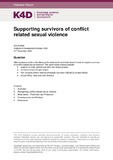| dc.contributor.author | Enfield, Sue | |
| dc.coverage.spatial | Africa | en |
| dc.coverage.spatial | Asia | en |
| dc.coverage.spatial | Latin America | en |
| dc.date.accessioned | 2021-01-04T15:31:00Z | |
| dc.date.available | 2021-01-04T15:31:00Z | |
| dc.date.issued | 2020-12-21 | |
| dc.identifier.citation | Enfield, S. (2020). Supporting survivors of conflict related sexual violence. K4D Helpdesk Report 931. Brighton, UK: Institute of Development Studies. | en |
| dc.identifier.uri | https://opendocs.ids.ac.uk/opendocs/handle/20.500.12413/15887 | |
| dc.description.abstract | This report is based on a rapid review of published academic literature. This highlights a dominant focus on conflict related sexual violence in Africa with less readily accessible information from conflicts in Asia and Latin America. Although sexual violence is directed at civilians of all ages, genders, and people with disabilities there is a lack of evidence from projects or responses specifically tailored to these categories. Although CRSV against women and girls is the subject of increasing research much less is known about the health of men, boys and lesbian, gay, bisexual, transgender (LGBT) and other gender non-binary persons who survive CRSV. Women and girls with disabilities face increased levels of sexual and gender-based violence in and out of the home, during conflict and crisis. This especially affects those with intellectual and mental disabilities. Women and girls with disabilities are also largely excluded from gender-based violence prevention programmes, aiming to break the cycle of vulnerability to violence. Assumptions are made that responses are generally helpful to all – this is at odds with some specific work that emphasises that approaches should be specific and related to the survivors own understanding and interpretations of the connections between the violence that they have experienced and the sexual nature of this. There is an acute lack of data that can be used to critically and systematically assess the focus and impact of the programmes designed to assist survivors of sexual violence. As systematic research on programme effectiveness is scarce, this represents a significant knowledge gap. | en |
| dc.description.sponsorship | FCDO (Foreign, Commonwealth and Development Office) | en |
| dc.language.iso | en | en |
| dc.publisher | Institute of Development Studies | en |
| dc.relation.ispartofseries | K4D Helpdesk Report;931 | |
| dc.rights.uri | https://www.nationalarchives.gov.uk/doc/open-government-licence/version/3/ | en |
| dc.subject | Gender | en |
| dc.subject | Rights | en |
| dc.subject | Security and Conflict | en |
| dc.title | Supporting Survivors of Conflict Related Sexual Violence | en |
| dc.type | Helpdesk | en |
| dc.rights.holder | © Crown copyright 2020 | en |
| dcterms.dateAccepted | 2020-12-21 | |
| rioxxterms.funder | Department for International Development, UK Government | en |
| rioxxterms.identifier.project | K4D | en |
| rioxxterms.version | VoR | en |
| rioxxterms.funder.project | 238a9fa4-fe4a-4380-996b-995f33607ba0 | en |

